- Home
- neetha Napew
Forbidden Land Page 2
Forbidden Land Read online
Page 2
Zhoonali took two steps back and glared at him. “Torka must not look at its face!” She was emphatic, and her face was set. He knew that she was waiting for him to turn away and deny life to his newborn child. The realization repelled him. If I must deny life to this infant, I must know why. I must see why or forevermore be haunted by the spirit of this life.
He extended his hands to Zhoonali and made a considerable effort to gentle his tone. “Once more, Zhoonali, Torka asks to look upon his child.”
Her head went higher, and she took another step back. Suddenly he was filled with anger. Before she spoke or stepped out of his reach, he pulled the covering off his child and took the infant forcefully. Zhoonali screamed as though he had struck her, and a gasp of incredulity went up from all who watched.
From the night shadows that laked before one of the larger pit huts, Cheanah, Zhoonali’s only surviving son, rose to stand belligerently in the moonlight. His broad features had the look of a riled, albeit cautious, bear. His three wolf-eyed sons came from the hut to stand beside him.
Torka paid them no heed. He held his child, braced to see the malformed and monstrous thing. Instead he stared at the bloodied, absolute perfection of his son.
The wind touched the flesh of the infant. The tender, unwashed skin prickled, and the little legs kicked. Arms shook as tiny fists clenched, and an equally tiny penis shriveled and turned blue. The fat little face contorted as, from healthy lungs, a ferocious squall of protest against the cold issued forth. Torka rejoiced in the warmth and voracity of the tiny life.
“It is not fit to live!” cried Zhoonali.
“It?” His anger toward Zhoonali was without bounds.
She was reaching for the child. “You do not understand!”
Backhanding her away, Torka silenced her with a dismissal that allowed no argument. The wind took the unlaced edges of her robe and blew them fully back and off, revealing her scrawny shoulders and sagging, greasy, ash painted breasts and belly. She cowered. She was so old. So tragically old. And so frail.
Torka felt sudden pity for her. He had no wish to strip her of her pride. Time allowed little enough dignity to those who managed to survive into old age. “This band has seen enough of death! Are you not weary of it, Zhoonali? This child that you have brought out to me, it is sound and male and has not taken the life of its mother. Look to the west, to the good omen of the new star, and welcome a new hunter into this band. Welcome the first child born in this new land!”
He held his newborn son high. His wide, strong, ungloved hunter’s hands cupped protectively around its buttocks and the back of its head.
The old ones said that cold put the first strong breath of life into little ones; it made them gasp and kick and cry for warmth. Torka drew the infant close. He breathed the warm breath of his life into its nostrils. He cradled it against his upper chest, enfolding it in his arms and the soft, golden warmth of his long-sleeved tunic of lion skins as he threw back his head and shouted with pride to the moon and the great black expanse of the star-strewn night. “Umak! Father of my father, hear me! May your life spirit flow now into the body of this child, to live once again in the flesh of one who will carry your name with pride. Umak, Spirit Master, is now Umak, son of Torka! Torka
accepts this life! Umak, may the—“
“Torka! No!”
Zhoonali’s shriek was enough to unnerve anyone in the camp. But the scream that followed it set terror and confusion loose within Torka’s gut: It was the howling scream of the wanawut—the voice of a wind spirit, a monstrous, predatory animal that, legend claimed, was part flesh, part spirit, bear, and man. The beast had been born at the beginning of the world to give meaning to the word fear.
No more than a moment passed, yet it seemed forever. No omen could be worse than the howling cry of the wanawut. It was a beast that walked with death. The wanawut did not scream again, but from across the encampment, within the hut of blood, Lonit’s cry of infinite pain rent the night.
Everyone gasped and ran to the clearing before that hut, where they stood looking at the hide door flap. Zhoonali, facing them, drew her robe back around her body and muttered that no child born to the screaming accompaniment of the wanawut could be accepted into the band, for it would guarantee death for them all. Nevertheless, it had been accepted. The child was a child now: It had a name, it had a life; it could no longer be taken from the encampment to become meat for beasts. Zhoonali looked up at the sky as a red, flowing aurora flamed across the night. The frozen skin of the tundra twitched and shivered with a minor earthquake.
The midwives came rushing outside, Xhan and Kimm wailing in fright. Only Wallah seemed contained. She looked up, shook her head, and gestured to Zhoonali. “Come. It begins again,” she announced and, with a sigh, returned to the hut.
“Again?” Torka was confused. He felt the arms of his little girls tighten around his legs. They were so young, so small; yet they could sense the tension and the danger around them, not only in the burning sky, the trembling earth, and the cry of the wanawut, but in the eyes of the people. “Why does Mother still cry?” Summer Moon whimpered. “Perhaps she cries in fear of the shivering earth, my little one.” Torka touched the top of her head with his free hand to calm her and wished that he felt as certain as he sounded.
The wind was rising. The earth was still, but the thunder of panicked herd animals sounded across the tundra. Dire wolves howled again in the surrounding hills, and somewhere, far away within mile-high glacial mountains that nearly encircled the tundral valley, an unearthly, half-human scream rent the night.
Karana was out there somewhere, unarmed. Torka hoped that the magic man was safe. He wished that Karana were here beside him, affirming the right of his child to a place within the band. He stared westward, looking for the new star, but it was late, nearly dawn, and the star had slipped over the edge of the world.
Torka held tiny Umak close. The single good omen that had preceded the infant’s birth had vanished, and in its place were roaring beasts, an unstable earth, a burning sky, and a screaming woman.
Zhoonali’s face twisted, but into malevolence or pity, he could not tell. “Your woman cries out because there is another! Yes! A twin! Two lives coming forth from the belly of one! It is forbidden! It is unnatural. It is what this woman was trying to tell you!”
Another child? Perhaps another son! Why should this be forbidden? Torka did not understand. “Twins are rare, Zhoonali, but not unnatural or forbidden among my people. Does not the great bear birth twins, and the wolf and—“
“Your people?” The stern voice of Cheanah was heavy with threat, like storm clouds roiling and bumping and growling with thunder. “We are your people now. Among the bands of Cheanah, of Grek, and of Ekoh, no omen-not even the rising of a new star—could justify the lives of twins! Look to the sky! Father Above is angry. Feel the movement of the earth! Mother Below is offended. The wanawut howls in the distant hills, and as always, Lonit, your favorite woman, takes too much upon herself! A woman is not a bear! A woman is not a wolf! In starving times, a woman with two sucklings grows weak. In the time of the long dark, a woman with two babies in her pack frame cannot carry her full share of the load when the band moves to new hunting grounds!”
His words were echoed by many mouths. Zhoonali, head held high, nodded; her bearskin robe took on the color of watered blood beneath the red aurora borealis. She ventured close to Torka and allowed herself the privilege of touching him—the most tender and motherly of pats upon his forearm, as though he were the son of her own body. “Since time beyond beginning, this has been the way of the people, Torka! You are a man of the far west, and perhaps among those of your own band, it was different. But of Torka’s band, only Lonit and Torka have survived. Perhaps because the spirits were angry with Torka’s people for allowing the lives of twins—“
“My band perished when a rogue mammoth rampaged through the winter camp, not because our women were allowed to give suck to twins. We have al
l felt the earth shake before, and we have all seen the sky burn with red rivers of light. These are not starving times. This band grows fat in a camp full of meat. The time of the long dark is ending. We have no need to move to new hunting grounds.” Torka turned to face the gathering. “It was said by Umak, grandfather of Torka, that in a new land, men must learn new ways! We are in a new land. We are one people now. We have survived the great falling and coming together of the Mountains That Walk. The way back into the land of our ancestors is closed to us—perhaps forever. In the meantime, I am headman, and while Torka is headman, the lives of infants are not thrown away. And only a magic man may interpret the omens.”
Cheanah sneered. “How convenient for you that the magic man is never in this camp when he is needed.”
“And if you wait on his word, your woman will surely die,” Zhoonali warned.
If there was magic in the Forbidden Land, Karana, the magic man, could not find it.
For two brief, pale, sun-hungry winter days, he searched. For two long, black, star-filled nights, he hunted. And for all of that time, an inner and unwelcome voice bit at his throat and whispered in the winds of his mind: You run from your people when they need you, Magic Man. You hide from your own inadequacy. Anyone could look at a new star and say that it is a good omen. But can you be certain? No! You are certain of nothing these days, you will never find the magic. Never!
The voice made him feel old and impotent. But he was young, lean, and as powerfully made as a stallion—and according to his woman, as restless and intractable. Across the long miles, he thought of his sweet, young, patient Mahnie, daughter of Grek and Wallah.
She had begged him not to go, warning him that there would be trouble if he left. Too often was he away from his people when they needed him, and too often was he away from Mahnie herself.
He knew the truth when he heard it, but it chafed his conscience far too much to admit that she was right. He lengthened his stride into a lope and refused to think of Mahnie. He named the unwelcome inner voice Liar until it spoke no more. It was not the voice he sought, and so he would not listen.
He carried no spear, no dagger, no snare nets for the taking of food, and nothing to aid him in the making of fire. He was alone with the great wolflike dog, Aar, and, he hoped, courage and wisdom. With such companions, he had no need of weapons. And the magic spirits with whom he sought communion would not speak to a man through a full belly or out of a warm and sated mind.
If he wanted to find magic, he must be an empty vessel, open to the spirit wind that would come only when he had put himself beyond the limits of flesh and blood and bone. He traveled as the wind travels—neither eating nor sleeping nor choosing his course, but allowing his steps to be directed by the unseen forces of the savage Ice Age earth and sky.
Now and again, the dog looked up at him with questions in its blue and watchful eyes. Why do you run? What do you seek? How much farther before you allow a friend to rest and eat?
“You may hunt and rest and feed as you will, Brother Dog, but I will not rest until I find the magic. For her.”
He passed Arctic lions, dire wolves, and a great short faced bear hungry after months of living off its own fat. The predators watched but did no more, for the magic man climbed into broad, spruce-fragrant hills of mammoth country with a stride that had neither hesitancy nor acknowledgment of danger in it. Like the wind, he bore no scent of vulnerability. Like the wind, he was unafraid-until now.
“Lonit!” He spoke her name aloud, and the un welcomed inner voice returned to stab him deeply.
Awash in the shimmering, blood-red glow of the northern lights, the wind blew his hood back from his face. With his unbound black hair whipping in the rising wind and his body encased in multilayered garments cut from the skins of every animal that was food for his people, he heard the distant scream of a woman and stopped dead in his tracks as the earth quivered beneath his booted feet.
You were wrong about the star, Magic Man! It was a bad omen. You knew that all along but had not the courage to stay and speak the truth. “You should not be here. You should be with Lonit, who has been as both sister and mother to you. You should be with Torka, who has named you Son although you are not of his flesh. You should be with your band, making spirit smokes and dancing ritual dances, so the forces of Creation will be merciful to Lonit-for you alone knew that two hearts beat within her belly. It is because of you that the earth has shaken and the sky has caught fire!
He felt sick with guilt and shame. His need for self justification was so strong, he spoke aloud to the inner voice.
“Had I stayed within the camp, my people would have seen that I have no powers! I do not know how to make true spirit smokes, dance true ritual dances, or chant true, time-honored chants to ease the delivery of Lonit’s babies! I could have bluffed and blustered, and the people would have been impressed, but the spirits and I would know the truth of such trickery! I fear to act lest the forces of Creation turn against those I love. I know that among my people, tradition demands that all twins must die! But I could not speak words that would deny the lives of Torka and Lonit’s newborn children! I could not! And so I look for good omens instead of bad! Even if I do not find them, the midwives will tend to Lonit’s needs, and the longer I stay away, the more likely the people will forget the tradition, or perhaps Torka will persuade the band to overlook it.”
And if they do not? the inner voice asked. When the worst has happened, Karana will be to blame.
Even the dog cocked its black-masked, grizzled head and seemed to frown at him.
Karana seethed with frustration. As a boy, he had been able to summon the rain and call the lightning from the sky. Since his earliest childhood, he had been able to look into the eyes of men and beasts and know what was in their hearts. He could set his spirit free to roam across the world, to scout the land, to find the herds of caribou and bison and elk and entice them to the hunting grounds of his people.
He had been born to be a magic man! And, indeed, he was—until entering the Forbidden Land. Now the power of Seeing was gone, the gift of Summoning denied, and not one of his kind was alive to teach him how to renew his strengths or explain to him why he had lost them.
Beside him, the dog’s ears went back, and a low growl formed deep within its broad, powerfully muscled chest. Karana, lost in thought, noticed no change in the animal. He was facing westward, staring back across the way he had come, waiting for Lonit to scream again. She did not. Had the birth been accomplished? There was a time not so long ago when he would have known.
He raised his head and like an animal sniffed the wind. It carried no scent of celebratory fires, smoke, roasted meat, or the habitation of men. He was far—too far—from the winter camp of his people. He closed his eyes and willed his spirit to fly across the tundra, to seek out the camp of his people, to discover if Lonit’s delivery had gone well or awry. But his spirit remained locked within the shell of his body, and he had not the power to free it.
There is no magic in this land, he thought. At least not for me.
Why had he lost his powers? Old Umak and Sondahr would have known. But both were murdered by enemies before either could teach him all he needed to know. Umak, grandfather of Torka, was sage, teacher, and spirit | master. Sondahr, wise woman, was seeress of the bands that convened at the Great Gathering. The pain of their loss was great in him.
“Umak! Sondahr!” he wept. “Speak to me from the spirit world. Help me! Put omens in my path that will tell me what to do. Return to me the gifts of Seeing and of Summoning so I may help Torka and my people! Help me to learn the proper way to chant so that Lonit and her babies will be strong through me. But by all the powers of the forces of Creation, do not ask me to be ultimately responsible for sentencing those babies to be abandoned as food for beasts!”
His sobs were so fierce with pain and need that the dog winced and backed away from him.
Ghosts whispered on the wind and taunted the magic man. But th
at is the condition of your power. You are too weak to work the will of the forces of Creation upon a pair of spiritless sucklings. And so your powers are no more. We will not listen to your pleas. Lonit’s twins will be denied life within the band. And you are not fit to keep the gifts of Seeing and Summoning. You will never find the magic you have lost because we, the ancients, have taken it away from one who is unworthy to possess it.
Truth struck him hard, but anger struck him harder. The voices had not offered what he wished to hear, nor were they the gentle, guiding counsel of Umak and Sondahr. These were the ghostly voices of malevolent strangers. Was Navahk, his true father, with them? Navahk, the deceiver, slayer of women and children, murderer and manipulator of men—Navahk the beautiful, the treacherous, the fearless, who had dared to slay a wanawut and dance in its skin.
Yes/ Even in death Navahk haunted his son and tried to deny him the shamanistic powers with which he had been born. The dog was growling. Again the magic man failed to notice. The ghost wind was whirling away to the east, into that far portion of the world where the sun would soon rise over high, massively glaciated mountains. Under similar ranges far to the west, Navahk lay buried under the rubble of a collapsed mountain range of ice. Karana was glad his father was dead.
He glared across the distances. The moon was setting, soon to follow the new star over the western horizon. The nearly full, pockmarked face of Father Above stared back at Karana dispassionately, without interest, as Father Above always did out of the black lake of the night. Only tonight his face was red and bloated in the light of aurora.
“I have not asked to be a magic man!” Karana shouted. “It is you, Father Above and all the powers of Creation, that have made me what I am! I have not asked for these heavy responsibilities. Give me signs so I may help my people—not condemn their children to death, as I was once condemned by Navahk, my own father!” It was in this moment that somewhere in the snow misted highlands that lay directly ahead the scream of an animal was followed by the screech of another.

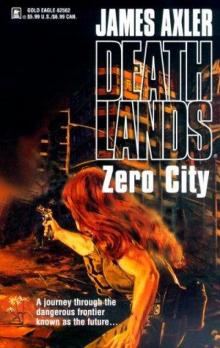 Zero City
Zero City Freedom Omnibus
Freedom Omnibus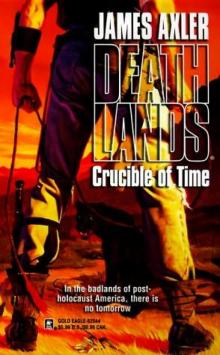 ACrucible of Time
ACrucible of Time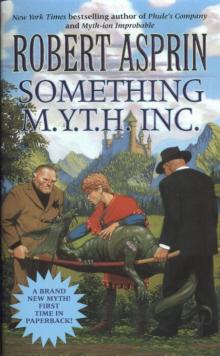 Something MYTH Inc
Something MYTH Inc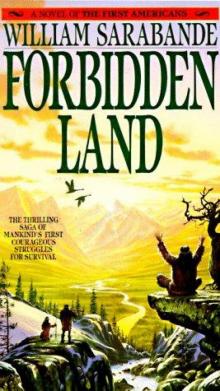 Forbidden Land
Forbidden Land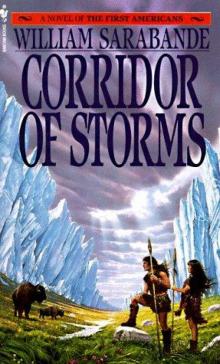 Corridor of Storms
Corridor of Storms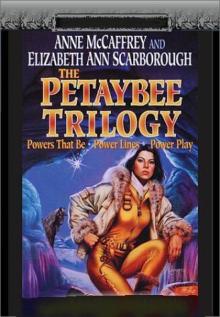 The Peytabee Omnibus
The Peytabee Omnibus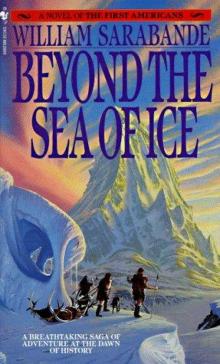 Beyond the Sea of Ice
Beyond the Sea of Ice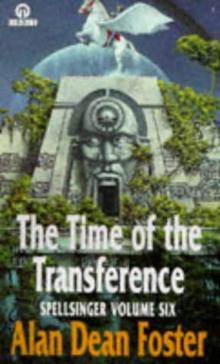 The Time Of The Transferance
The Time Of The Transferance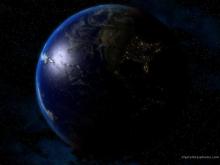 EarthBlood
EarthBlood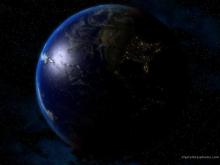 The Lexal Affair
The Lexal Affair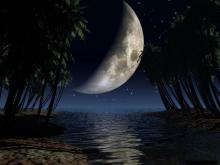 The Web
The Web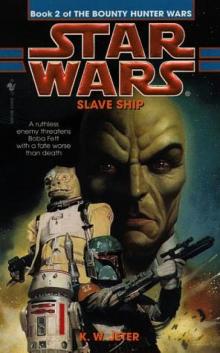 Slave Ship
Slave Ship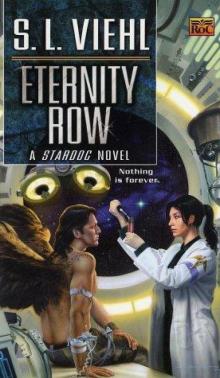 Eternity Row
Eternity Row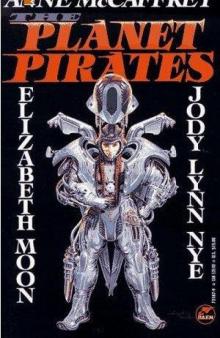 Planet Pirates Omnibus
Planet Pirates Omnibus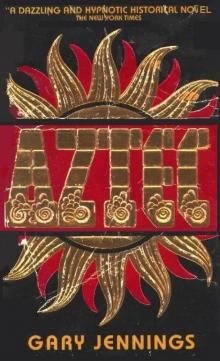 Aztec
Aztec The Awakening
The Awakening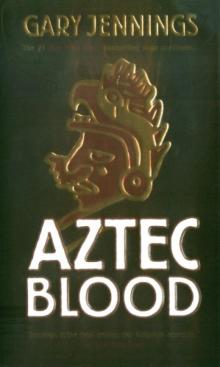 Aztec Blood
Aztec Blood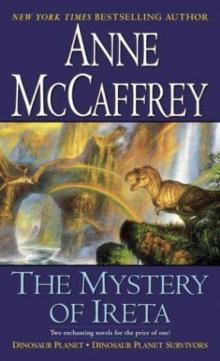 The Mystery of Ireta Omnibus
The Mystery of Ireta Omnibus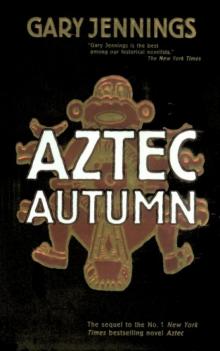 Aztec Autumn
Aztec Autumn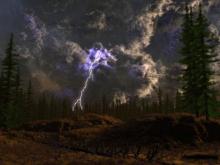 The Savage Horde
The Savage Horde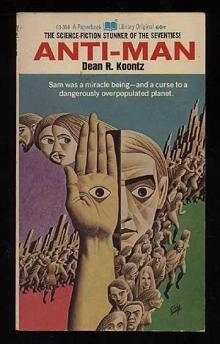 Anti - Man
Anti - Man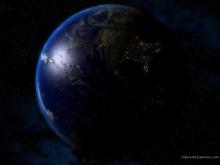 Deep Trek
Deep Trek Starfall
Starfall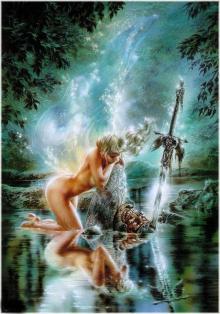 The Paths Of The Perambulator
The Paths Of The Perambulator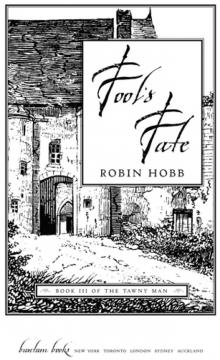 Fool's Fate
Fool's Fate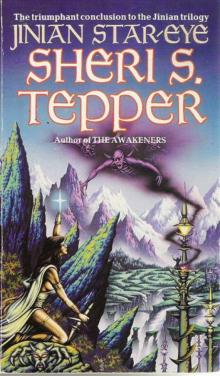 Jinian Stareye
Jinian Stareye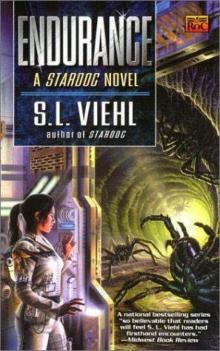 Endurance
Endurance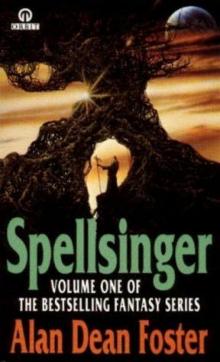 Spellsinger
Spellsinger Hybrids
Hybrids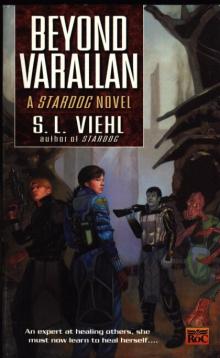 Beyond Varallan
Beyond Varallan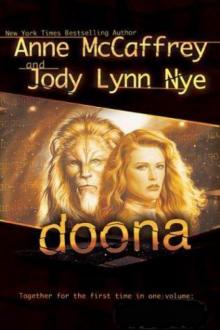 Doona Trilogy Omnibus
Doona Trilogy Omnibus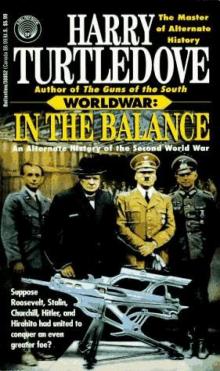 In th Balance
In th Balance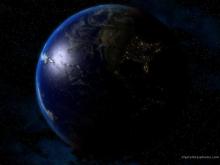 Planerbound
Planerbound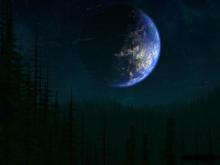 The Nightmare begins
The Nightmare begins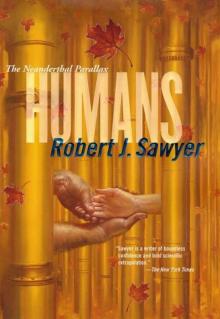 Humans
Humans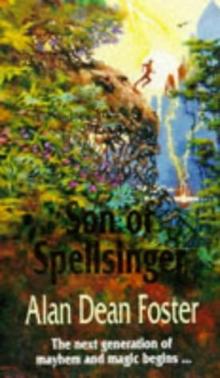 Son Of Spellsinger
Son Of Spellsinger